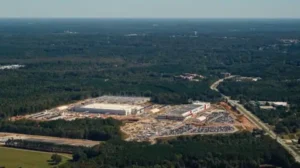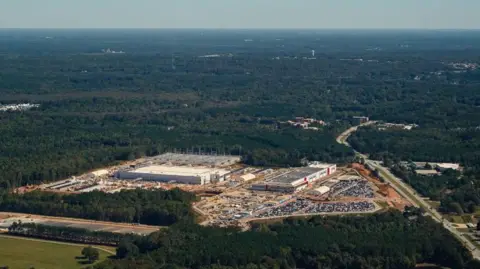### The Struggles of Rural Living Next to a Data Center
Beverly Morris, who believed she had discovered her dream home upon retiring to a serene area of Fayette County, Georgia, now faces a harsh reality. Since the establishment of a significant data center, just a short distance from her porch, her idyllic surroundings have turned into a concerning situation. This large, windowless facility, operated by Meta — the parent company of Facebook — bears the brunt of her frustrations.
Living adjacent to this data center has drastically impacted Morris’s quality of life. She reports persistent problems with her water supply, expressing serious concerns regarding the water’s safety. “I can’t drink the water,” Morris laments, explaining that she now resorts to carrying water in buckets just to flush her toilet. This drastic change in her daily routine points to a more profound issue: the potential disruptions faced by homeowners when high-demand modern structures, such as data centers, encroach on their lives.
### Unseen Consequences
Morris’s plight exemplifies a growing conflict between local residents and the development of expansive data centers across rural America. These facilities, serving as hubs for an ever-expanding digital industry, require substantial resources, including water. Morris believes that the building of the Meta data center has altered the conditions of her well, resulting in a distressing accumulation of sediment in her water supply. Despite her issues, Meta contends that their operations are not responsible for Morris’s water troubles.
While Morris has had to undertake plumbing repairs to restore some functionality in her kitchen, the water continues to emerge from the tap with visible residue. This has led her to a troubling conclusion about her domestic water quality: “Am I worried about it? Yes,” she admits, further illustrating the psychological toll of her situation.
### Corporate Accountability
In response to Morris’s concerns, Meta released a statement underscoring their commitment to being good neighbors. They commissioned an independent groundwater study, which reportedly found no negative impact on local groundwater attributed to the data center. However, this assertion has not lessened the burden felt by Morris, who reflects poignantly, “This was my perfect spot. But it isn’t anymore.”
Such personal narratives capture the emotional struggles wrought by large-scale technological advancements and raise questions about corporate responsibility when it comes to local residents’ well-being. As these data centers proliferate across states like Georgia, they often bring the promise of increased economic growth while simultaneously generating challenges for communities.
### The Bigger Picture
The data center dilemma extends beyond Morris’s immediate concerns. Georgia, in particular, has embraced a burgeoning number of data center projects, which offer undeniable financial benefits but also bring environmental concerns. The state’s climate allows for more cost-effective cooling solutions for these centers, yet this leads to an increase in water consumption. Mark Mills, an expert from the National Center for Energy Analytics, testified that the cooling systems utilized in these centers can draw massive amounts of water to ensure efficient operation.
Estimates suggest that AI-driven data centers could consume upwards of 1.7 trillion gallons of water globally by 2027, further intensifying debates over resource management. Conversations concerning data centers, water usage, and their respective impacts are becoming vital as technology continues its relentless advancement.
### Moving Toward Sustainability
As technology firms grapple with the environmental implications of their developments, some, like Amazon Web Services (AWS), have made promises to implement more sustainable practices. AWS’s global water stewardship lead, Will Hewes, noted intentions to restore more water to local watersheds than they extract. The goal is precise: to pivot towards more responsible water management of extensive operations.
While long-term changes may alleviate some of the burdens on local communities, the immediate challenges remain daunting for residents like Beverly Morris. The dichotomy between advancing technology and preserving community integrity reveals the complexities these rural areas must navigate as they attempt to balance progress with quality of life.
### Conclusion
The growth of data centers represents a critical intersection of technology and community needs, and places like Fayette County are at the forefront of this battle. While the allure of technological advancements can promise economic prosperity and connectivity, it also brings daunting challenges, especially concerning vital resources such as water. The shared stories of residents impacted by such developments are a potent reminder that modern infrastructure must be pursued with equitable consideration for those who call these neighborhoods home, ensuring everyone’s interests are adequately protected as the digital age progresses.











